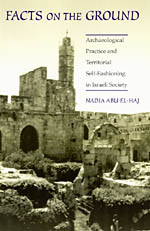And the controversy continues…

The New York Times reported today about the controversy surrounding the work of Barnard professor of anthropology Nadia Abu El-Haj, whose 2001 Facts on the Ground: Archaeological Practice and Territorial Self-Fashioning in Israeli Society has sparked disputes in and out of academe since its publication.
El-Haj’s work is an analysis of archaeological practice in Israel, attempting to explain the complicated interplay of politics and science in the Middle East and the ongoing role that archeology plays in defining the past, present, and future of Palestine and Israel.
El-Haj is currently up for tenure at Barnard, but due to the controversial nature of her work, she has some powerful opponents who claim that her own findings have been influenced by political interests. From the New York Times:
It is Dr. Abu El-Haj’s book, Facts on the Ground: Archaeological Practice and Territorial Self-Fashioning in Israeli Society, that has made her a lightning rod, setting off warring petitions opposing and supporting her candidacy, and producing charges of shoddy scholarship and countercharges of an ideological witch hunt.…
The Middle East Studies Association, an organization of scholars who focus on the region, chose her book in 2002 as one of the year’s two best books in English about the Middle East. The other was Being Israeli: The Dynamics of Multiple Citizenship, by Gershon Shafir and Yoav Peled, published by Cambridge University Press.
Jere L. Bacharach, a historian at the University of Washington who presented the awards, said at the time that both books were “nuanced, nonpolemic works on subjects that too often lend themselves to political tirades and polemics.”
Critics of Dr. Abu El-Haj’s book, however, said her aim was to undermine Israel’s right to exist, and challenged her methodology and findings.
Read the rest of the article on the New York Times website. Also read an excerpt from Facts on the Ground previously posted to this blog.